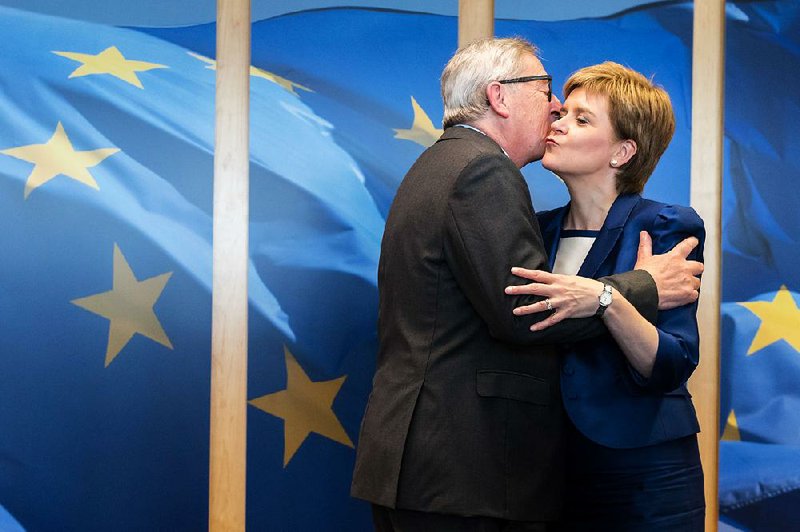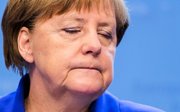BRUSSELS -- European Union leaders said Wednesday that the United Kingdom cannot keep valuable business links with its former continental partners unless it's willing to accept European workers.
British voters last week chose to leave the EU after a referendum campaign in which migration was a key issue. The decision by European leaders Wednesday highlights the complex departure negotiations facing Prime Minister David Cameron's successor, a position for which nominations opened Wednesday in London.
Meeting without the U.K., the 27 other EU nations set out a united strategy to face the next British government. They emerged from the summit insisting that the "four freedoms" central to European unity are indivisible: the free movement of people, services, goods and finances.
European Council President Donald Tusk said that in Cameron's absence, the remaining presidents, chancellors and prime ministers showed a firm, common resolve, committing to be "absolutely determined to remain united."
Luxembourg Prime Minister Xavier Bettel said, "With a disunited United Kingdom, we need a united Europe more than ever."
In a statement after the meeting, the leaders acknowledged that the British referendum "creates a new situation for the European Union" and that "many people express dissatisfaction with the current state of affairs." Europeans, they added, "expect us to do better when it comes to providing security, jobs and growth, as well as hope for a better future."
Tusk called a special EU summit for Sept. 16 in Slovakia to work out a plan to keep the EU united. There's a widespread sense that the EU has become too bureaucratic and undemocratic, with not enough benefit for its 500 million citizens. The initial EU founding nations in the west lean toward a tighter, closer union, while newer nations in the east want to keep more control through the national governments -- notably of their borders.
French President Francois Hollande warned that allowing the status quo to continue would benefit populist forces that seek "the end of Europe." France is among the EU countries now facing calls for referendums on quitting the bloc.
German Chancellor Angela Merkel said Wednesday that the lesson from Britain's departure isn't necessarily a choice between deeper integration or returning more powers to national governments. "This is not about more or less Europe as a principle, but about achieving better results," she said.
She said that combating youth unemployment, for example, could involve both scrapping EU directives and deepening European cooperation.
"The coming weeks will be decisive," Hollande said. "Europe must show its solidity."
That will be tough when it comes to immigration. Central European nations led by Hungary refuse to accept imposed EU refugee quotas, and countries farther north tightened border controls in response to the arrival of more than 1 million migrants last year. Britain is more concerned about EU immigration, since its economy draws hundreds of thousands of workers from other EU nations.
Replacing Cameron
In London, British lawmakers worked to chart a new course for the government in the aftermath of the referendum. Nominations opened Wednesday to replace Cameron as leader of the Conservative Party, with Work and Pensions Secretary Stephen Crabb the first official contender. Former London Mayor Boris Johnson and Home Secretary Theresa May are also expected to run.
Cameron used his weekly question time in Parliament to heap further pressure on opposition leader Jeremy Corbyn, demanding that he step down after the bulk of Labor Party lawmakers passed a motion of no confidence against their chief.
"It might be in my party's interest for him to sit there," Cameron told the House of Commons. "It's not in the national interest. And I would say: For heaven's sake, man, go!"
Corbyn is facing the prospect of a formal bid to unseat him because he refused to resign after the no-confidence motion, which he lost in a 172-40 vote of Labor lawmakers on Tuesday.
Labor lawmakers, who oppose leaving the EU and blame the referendum's outcome on their leader's half-hearted campaigning, sat impassively as Corbyn asked Cameron questions about the effects of leaving the EU.
Cameron, who received a letter of support from more than 80 of his party's lawmakers last Thursday evening, yet still resigned Friday after the results were announced, turned the talk to Corbyn's role in the referendum campaign.
"I know he says he put his back into it," Cameron told the chamber. "All I can say is, I'd hate to see him when he's not trying."
Last week's vote also has spurred concerns that the U.K. could unravel. Scotland First Minister Nicola Sturgeon met Wednesday in Brussels with European Parliament President Martin Schulz and European Commission President Jean-Claude Juncker. Scottish voters overwhelmingly chose to remain in the EU but were drowned out by English voters. Sturgeon has indicated that there may be a new referendum on Scottish independence.
"It was a good opportunity for me to set out Scotland's position and Scotland's desire to remain within the European Union and to protect our relationship with the European Union," Sturgeon said after meeting Schulz. "I don't underestimate the challenges that lie ahead for us seeking to find a path."
Juncker, the leader of the EU's executive arm, said Scotland should be able to set out its position after voting to remain in the EU.
"Scotland won the right to be heard in Brussels," Juncker said before meeting with Sturgeon. He said, though, that the EU has no "intention to interfere in the British process."
His comments quickly drew a rebuke from Spanish Prime Minister Mariano Rajoy, who said that if Britain quits the EU, then Scotland must leave, as well.
"The Spanish government is against -- and I'm sure that everyone agrees with me on this -- that talks are held with anyone but the U.K. government," Rajoy said. "Scotland doesn't have any powers to hold such talks."
Former U.K. Prime Minister Gordon Brown said it would be reckless for Scotland to pursue EU membership at the expense of relations with the U.K. About two-thirds of Scottish exports go to the rest of Britain.
"Surely it's reasonable to look at how to secure our position in both markets," Brown, an opponent of Scottish independence, said at an event in Edinburgh.
Information for this article was contributed by Raf Casert, Geir Moulson, Jill Lawless, John-Thor Dahlburg, Lorne Cook and Angela Charlton of The Associated Press; by Alex Morales, Robert Hutton, Joe Mayes, Rodney Jefferson, Ian Wishart, Esteban Duarte, Karl Stagno Navarra and Helene Fouquet of Bloomberg News; and by James Kanter and Andrew Higgins of The New York Times.
A Section on 06/30/2016


